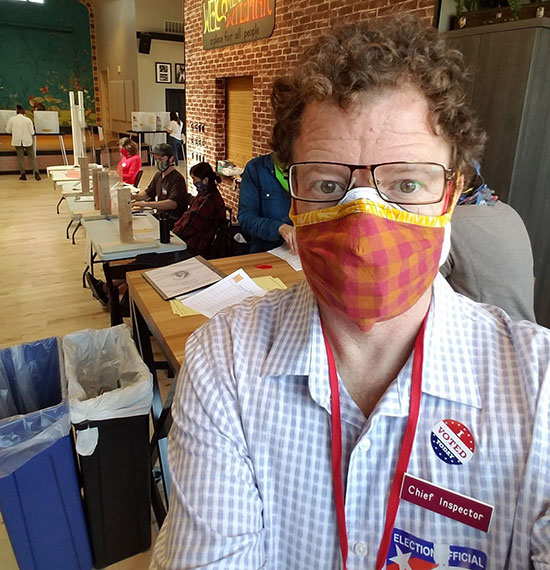
Madison Attorney Rudy Moore volunteers as a chief inspector for the city’s Ward 42, at the Wil-Mar Neighborhood Center on Madison’s near east side. Moore took this photo of himself in April 2020, the first election during the COVID-19 pandemic.
Sept. 16, 2020 – Every Election Day, Madison attorney Rudy Moore heads to the Wil-Mar Neighborhood Center on Jenifer Street – where the Yahara Room is the polling place for Madison’s Ward 42.
He’s there not just to vote – he is also the location’s chief inspector. Since 2008, Moore has been a poll worker. For the past six years, he’s been in charge of the Wil-Mar Center location.
“I have a deep interest in seeing elections run fairly and smoothly,” Moore said. “Elections are the lifeblood of our society. There are so few ways where we can directly help run our country; this is one of them. Being a poll worker has felt like a civic function that I could perform that directly helps our country.”
Milwaukee attorney Brenda Lewison also works, on and off since 2000, as a poll worker. She initially volunteered as an election protection observer. “I quickly learned that I could do more good working as an educated, conscientious poll worker than I could by simply observing what was going on and reporting on what I believed to be problems.”
In the August primary election, La Crosse lawyer David Pierce Jr. volunteered for the first time as a poll worker. After polling locations in La Crosse were reduced in April due to COVID-19, he “realized it should be on my – younger – generation to step up to help during this pandemic, given that we engender less risk,” he said.
More workers are needed in November. According to the Wisconsin Election Commission, 40 counties and 141 municipalities were more than 700 workers short for the Aug. 11 Partisan Primary. While Wisconsin National Guard members assisted that Election Day, there is no guarantee they will for the Nov. 3 General Election.
States across the country – including Wisconsin – are predicting a shortage of workers to serve for the November election.
And the American Bar Association is putting the word out: Lawyers are needed to serve as poll workers for the November election. This is an opportunity for lawyers, soon-to-be lawyers, and legal professionals to step up and serve.
Why Lawyers Make Good Poll Workers
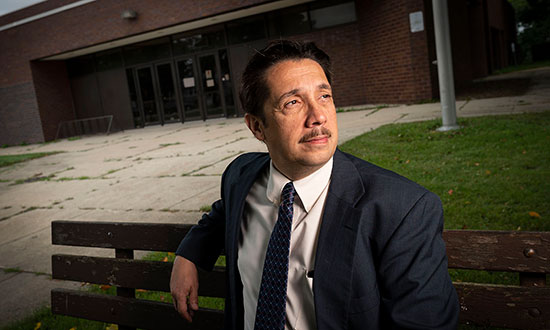
Andrew Chevrez sits on a park bench outside the entrance of Pulaski Pool in Milwaukee, where he volunteers as a poll worker on election days. The work, he says, is worthwhile and rewarding.(Photo: Kevin Harnack)
In Milwaukee, attorney Andrew Chevrez has volunteered as a poll worker since 2012 on the city’s south side. “Because I speak Spanish, I was a welcome addition in providing language assistance,” he said.
But whether or not you speak more than one language, “more lawyers are needed to work the polls,” Chevrez said.
“It is especially important for attorneys to become poll workers because we are used to reading rules and laws and applying them to the facts at hand. For some poll workers, this type of analysis is unfamiliar,” Lewison said.
“There are rules and procedures for just about everything,” Chevrez said. “Being a lawyer helps, because some of the election process laws and procedures are more complicated than you might think.”
As a lawyer, Moore is familiar with handling the minutiae of his solo law practice – and that transfers to working the polls. “I realized that the same focus on details and problem-solving that makes law so satisfying could be applied to that deep interest in seeing orderly and fair elections take place,” Moore said. “I feel like I'm giving back in some little way for how much this country has given me.”
At times, a busy practice doesn’t allow much time for pro bono work. “Working as a poll worker provides a time-limited opportunity for an attorney to give back to the community at large,” Lewison said. “And it is very rewarding to participate in such civic engagement,” she said.
A Day in the Life of a Poll Worker
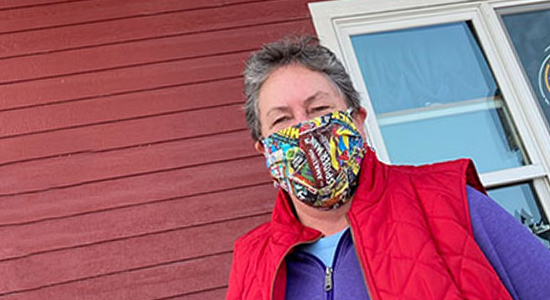
Milwaukee attorney Brenda Lewison has volunteered as a poll worker on and off since 2000.
According to myvotewi.gov, poll workers must be a qualified elector of the county where the municipality they are volunteering for is located – that is, an adult U.S. citizen who has lived in the election district at least 28 days consecutively and is not otherwise disqualified to vote. They must be able to read and write English fluently, and not be on the ballot as a candidate for that polling place.
First-time volunteers undergo a half-day training course to serve as greeters, receivers, registrars, and machine attendants.
Chevrez typically works as a registrar, helping with same-day voter registration, which he deems a worthwhile and rewarding task. “It feels good to register people. My favorite person to register is the first-time young voter.”
Election inspectors – who receive more training – operate the polling places on Election Day in Wisconsin. While the number can vary depending on municipality, each location typically needs seven inspectors, according to the Election Day Manual for Wisconsin Election Officials published by the Wisconsin Elections Commission. Volunteers wishing to be inspectors apply to and are appointed by the local government to serve two-year terms. Duties include setting up the location, registering and recording electors, issuing ballots, monitoring the voting equipment, counting the votes, and completing required forms.
Moore’s position as a chief inspector requires specific training and certification beyond those of election inspectors. They are in charge of a polling location, and act as liaison between the local municipal clerk and the election inspectors.
Wondering about the hours of work and want to know more about poll worker duties and how to sign up? See the Aug. 31, 2020, press release Wisconsin Needs Poll Workers for November! from the Wisconsin Election Commission.
Gaining Assurance in the System, Firsthand
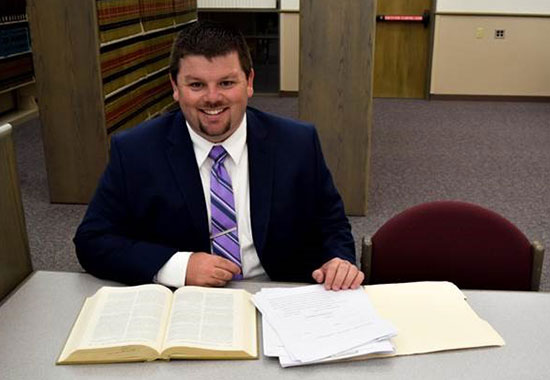
La Crosse lawyer David Pierce Jr., pictured here at his firm, worked for the first time as a poll worker in the primary election in August.
Pierce said his experience as a poll worker in the August primary election makes him feel more secure about the integrity of our voting system.
“It was great to see the checks and balances at work – to make sure that mail-in voters did not also vote in person, to make sure that the mailed in ballots coincided with an already-registered person on the books,” says Pierce. “It is great to see the lengths that election officials go through to make sure there is no tampering with ballots between the precinct and city hall, such as the use of evidence bags to seal the ballots.”
Those efforts, he said, are painstaking and sometimes even annoying – such as checking each and every ballot to ensure there is a poll worker’s signature or initials on it – but ensure the system’s integrity. “After, it makes you realize how well-designed our system is,” Pierce said.
“Plus, it is now easier for me to explain that voter fraud arguments are not based in reality,” he said.
Why Always, Why Now
Being involved in election work roots you in your community, Moore said.
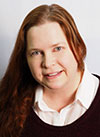 Shannon Green is communications writer for the State Bar of Wisconsin, Madison. She can be reached by email or by phone at (608) 250-6135.
Shannon Green is communications writer for the State Bar of Wisconsin, Madison. She can be reached by email or by phone at (608) 250-6135.
“You meet and interact with members of your direct community that you might otherwise never see,” Moore said. “It's satisfying to be part of the process: to register voters, to sign them into the poll books, to hand them their ballots, and to ultimately see their votes counted.”
Especially in 2020, it is important for more people to step forward and volunteer.
“If there ever was a time to step up, it is now. Because of the way the coronavirus ravages older people and people with preexisting conditions, we have an incredible shortage of poll workers,” Moore said. “At the same time, the needed shift to absentee voting means there is so much more work required to process those absentee votes.
“Without sufficient poll workers, I worry whether the ability to exercise our essential right to vote will be hampered,” Chevrez said. “I urge my fellow Bar members to consider working as a poll worker in November.”
To find out more about signing up, visit myvotewi.gov.
Other Opportunities for Volunteering for Elections
Not everyone can or should work at the polls. But there are ways lawyers can, in a nonpartisan way, support the election process in their communities. They can support their staff who volunteer, and get to know the resources that will help them guide their clients.
Lawyers may encounter the myriad questions on how to vote from clients and others seeking to inform themselves on how to ensure their votes count. Questions include:
-
when is the election?
-
where and how do I register to vote?
-
how do I vote via absentee ballot?
-
where can college students vote?
Find the answers and resources to help you answer these election questions in 2020 Election Voting Guide: Help Keep Your Communities Informed, from WisBar News, Sept. 9, 2020.
Elections Resources for Lawyers
The Wisconisn Elections Commission hosts the My Vote Wisconsin website that provides answers to many voting questions. On this website, you can locate your voting history, your particular polling place, and what is on your ballot. You can use the website to register to vote and learn about voting absentee.
The American Bar Association’s Poll Worker, Esq. website is a "rally cry" aimed at mobilizing lawyers, law students, and other legal professionals to become poll workers for the upcoming 2020 election. The ABA is partnering with the National Association of Secretaries of State and the National Association of State Election Directors on this nonpartisan effort designed to help people vote and to help local officials ensure a safe and accurate election.
Can I Vote is a nonpartisan website run by the National Association of Secretaries of State (NASS) to help eligible voters find out how and where to vote. Information is available in Spanish and English on registering to vote, finding out your registration status and polling place, determining valid forms of ID, overseas voters’ information, requesting ballots, and becoming poll workers.
U.S. Vote Foundation is a private, nonprofit, nonpartisan public charity founded in 2005. Its website provides a way to look up a directory of election officials by municipality, and state voting requirements and information, at usvotefoundation.org. You can find Wisconsin voting requirements and information, including dates and deadlines for ballots, using this link.
The ABA also hosts a nonpartisan Election Center, a webpage with resources on voter registration, polling places, candidate information, election dates, and more. It also offers a free-to-members Election History webinar, The 19th Amendment Then and Now: Lessons for the 21st Century.
